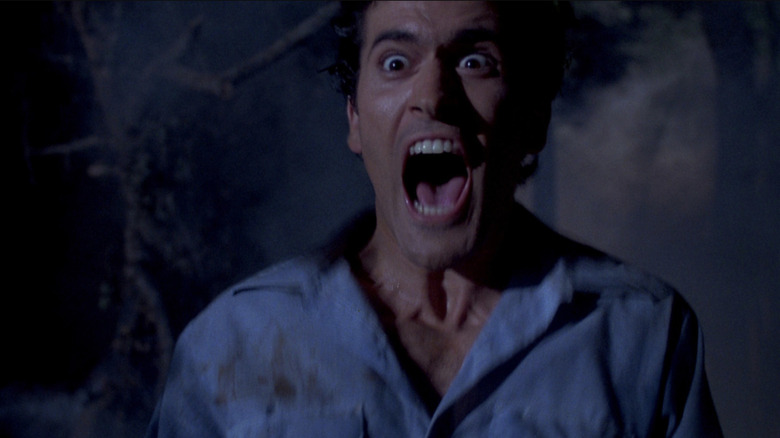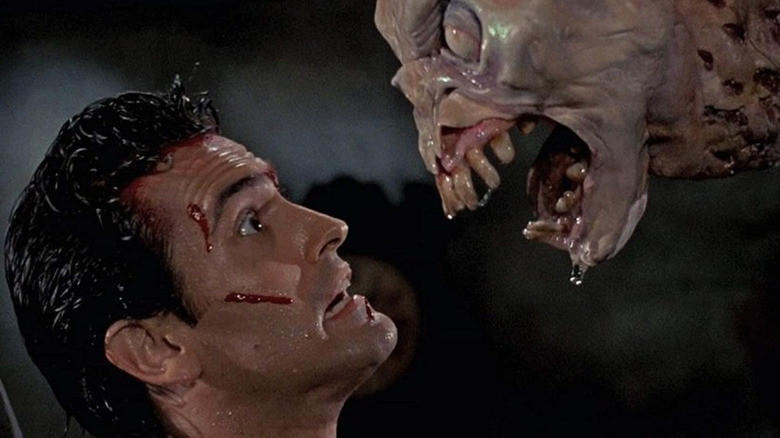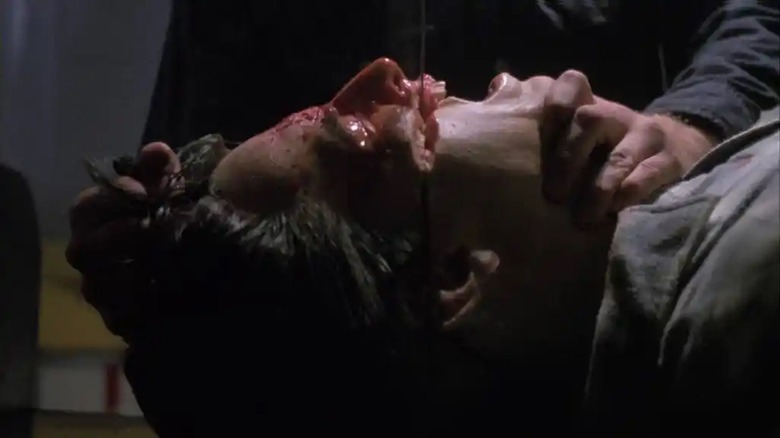Evil Dead II Wouldn't Be The Classic It Is Today Without This Writer's Contributions
On the surface, it would appear that Sam Raimi's "Evil Dead II" was a late-arriving sequel, but, according to the director, the first installment did "very poorly domestically" during its initial theatrical release. Though I grew up a little over an hour south of Raimi's hometown, Detroit, Michigan, where it premiered in 1981, I knew nothing of the movie until I beheld a series of gloriously gnarly glossy stills in Fangoria Magazine at some point in 1983. Soon after, the movie turned up at my local video store, and my torrid love affair with the cinema of Sam Raimi began.
Four years was still a long time to wait for a follow-up to "The Evil Dead" (a title Raimi hated), but Fangoria kept writing about the first movie and insisting that a sequel was in the works. And so I dreamed the goriest of dreams, wondering how Raimi might top his brilliant original movie with, presumably, a larger budget. Would the evil force unleashed by the Necronomicon Ex-Mortis possess sole survivor Ash (Bruce Campbell) and wreak havoc on civilization? Or would it venture forth on its own and find a new set of victims?
I couldn't have predicted the gonzo direction in which Raimi went with "Evil Dead II" because I was wholly unacquainted with the goofball sensibility of the film's co-writer Scott Spiegel. It's possible his name came up in some of Fangoria's exhaustive coverage of "The Evil Dead," but I had no sense of this maniac's slapstick comedic genius. Thankfully, Raimi brought his old Michigan buddy on board to script the sequel, which is only one of the greatest horror films ever made and quite possibly the funniest.
Scott Spiegel and Sam Raimi were on the verge of washing out of Hollywood in the 1980s
Scott Spiegel, who recently passed away at the age of 67, was a maestro of madcap mirth. Inspired heavily by The Three Stooges, he shot a series of 8mm short films with a comedy trio he eventually dubbed Spiegel, (Matt) Taylor, & (Tim) Quill. A key member of the group's company was Bruce Campbell, who served as a foil to their boneheaded antics. Eventually, his high school classmate Sam Raimi joined the troupe, and he quickly exhibited uncommon directorial chops.
Spiegel would go on to play Scott in the 1978 short film "Within the Woods," a dry, calling-card run for "The Evil Dead." The character would be portrayed by Richard DeManincor in the feature. In 1985, he took a crack at finding a wider audience as a producer with the Josh Becker-directed exploitation flick "Thou Shalt Not Kill... Except" (which co-starred Raimi as a Charles Manson-esque cult leader), but the revenge film failed to catch on.
Suddenly, it was 1986, and, after the box-office debacle of "Crimewave," a zany crime comedy directed by Raimi (who co-wrote the screenplay with Joel and Ethan Coen), both Raimi and Spiegel were stuck in a filmmaking rut. Legendary producer Dino de Laurentiis approached Raimi about directing an adaptation of Stephen King's "Thinner," but the young, ambitious filmmaker declined the offer. Raimi believed his best shot at making the leap was a sequel to "The Evil Dead." So, he called Spiegel in to co-write the movie in the hopes of working a crowd-pleasing variation on the material. Oh, baby, did those boys hit paydirt.
When Raimi and Spiegel set out to write the screenplay for "Evil Dead II," they let their imaginations run wild. Some of what they dreamt up (a group of escaped prisoners menacing Ash while seeking buried treasure, and a version that would've conjoined "Evil Dead II" and "Army of Darkness") proved way too expensive to realize. Even when de Laurentiis (with an assist via Stephen King) came through with $3.6 million in financing, the duo had to make drastic cuts to their screenplay. This is why Ash (Campbell) and Linda (Denise Bixler) are the only occupants of the cabin at the outset of the movie. Consider this carnage reduction.
Scott Spiegel brought the Three Stooges energy to Evil Dead II
The most important creative decision overall came from Spiegel, who thought Raimi should back away from the pure horror of "The Evil Dead" and make a horror sequel that leaned heavily on the comedic expertise they'd developed during their formative years as 8mm filmmakers. A gore-drenched horror-goof rife with slapstick bits inspired by The Three Stooges? Stuart Gordon's "Re-Animator" possessed a bit of this antic energy, but Spiegel wanted to go all out, and, fortunately, Raimi was game. Some of the bits were battle-tested (Ash waging war against his severed hand was nicked from Spiegel's short film "Attack of the Helping Hand," in which a woman is assaulted by the Hamburger Helper logo), but pulling these gags together to form a coherent horror movie was uncharted territory. This was not "Abbott & Costello Meet Frankenstein." It was relentlessly gory, X-rated slapstick horror. We'd never seen anything like it.
Spiegel's post-"Evil Dead II" career got off to a promising start with the grocery store slasher flick "Intruder," which, in 1989, earned Lawrence Bender his first producing credit. Spiegel took credit for introducing Bender to a young video store clerk named Quentin Tarantino, and worked with the latter several times over the years (directing "From Dusk Till Dawn 2: Texas Blood Money," "My Name Is Modesty," and "Hostel: Part III" under the Oscar-winning filmmaker's aegis). Amusingly, the much-remarked-upon Fruit Brute cereal box in "Pulp Fiction" belonged to Spiegel.
Spiegel was apparently an inveterate prankster. He once tricked Ethan Coen into answering a telephone receiver coated in shaving cream while living in a house that boasted Raimi and five future Oscar-winners (the Coens, Frances McDormand, Kathy Bates, and Holly Hunter) as occupants. Hunter was Raimi and Spiegel's first choice to play Bobby Joe in "Evil Dead II," but the producers didn't think she was sexy enough. Oy.
In a town full of getting-over ghouls, Spiegel was regarded as a true, talented mensch. Yes, he got co-writing credit on one of Clint Eastwood's worst movies (the script for which reads like it was written for Raimi to direct), but he helped change the face of horror. Spiegel was loved, and he will be missed.


